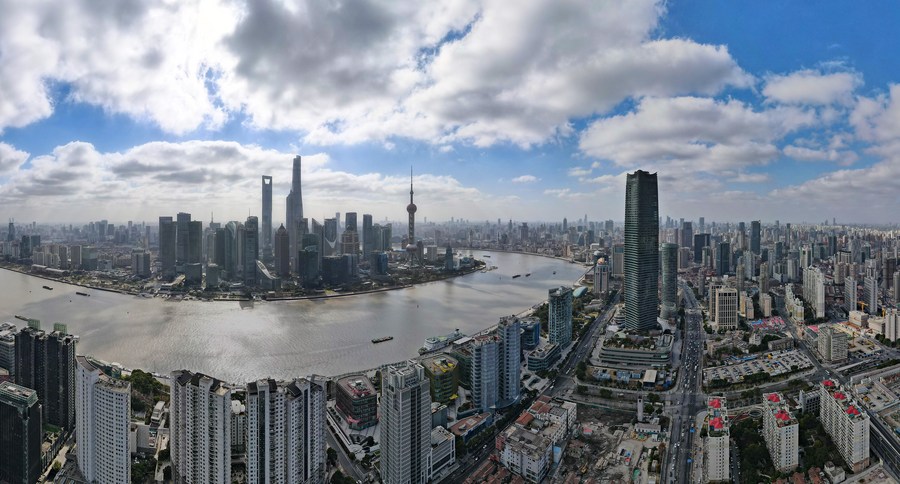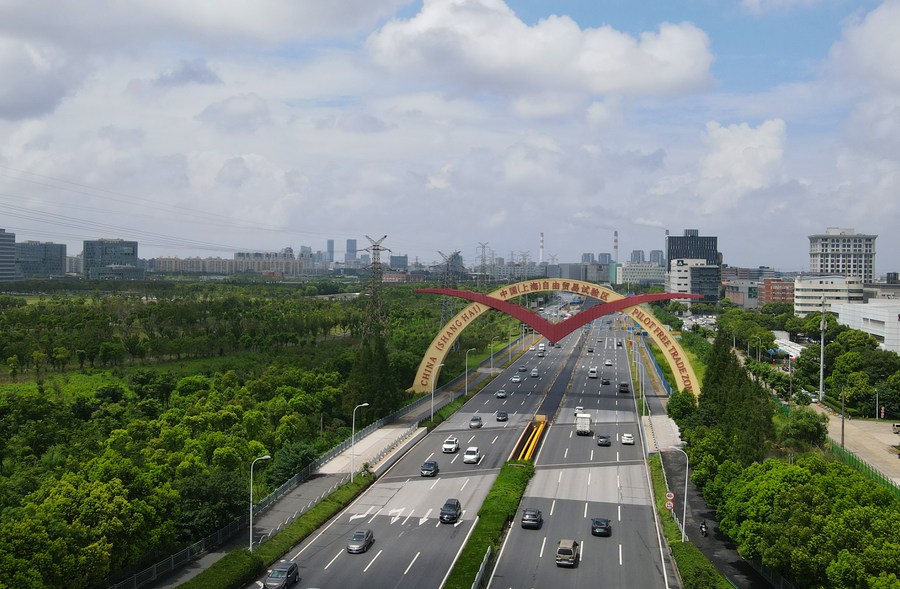Interview: Shanghai Free Trade Zone great institutional innovation for global trade, development, says Nicaraguan minister

This panoramic aerial photo taken on Jan. 10, 2023 shows a view of Lujiazui area in the China (Shanghai) Pilot Free Trade Zone in east China's Shanghai. (Xinhua/Fang Zhe)
The Shanghai Free Trade Zone "is extremely important for foreign trade because it serves as a mechanism to simplify trade in general, creating a more efficient and competitive business ecosystem," Nicaraguan Minister of Development, Industry and Trade Jesus Bermudez told Xinhua.
by Jose Gabriel Martinez
MEXICO CITY, Oct. 6 (Xinhua) -- The China (Shanghai) Pilot Free Trade Zone (FTZ) is a great institutional innovation that has played an important role in global trade and development over the last decade, Nicaraguan Minister of Development, Industry and Trade Jesus Bermudez has said.
In a recent interview with Xinhua, Bermudez said that "a greater degree of competitiveness in global trade is the key to success," and that is precisely what the Shanghai FTZ, the first of its kind, has offered since its launch in China in 2013.
The Shanghai FTZ is a pioneer project which established an unprecedented degree of openness in relation to foreign investment and international trade, both in goods and services, said Bermudez.
"It is extremely important for foreign trade because it serves as a mechanism to simplify trade in general, creating a more efficient and competitive business ecosystem," he said.
Pilot FTZs have accelerated China's process of economic transformation and modernization, something Nicaragua understands well and has implemented at home for years, taking into account the country's own characteristics and development needs, he added.
"It is something that we share with China. We also have free trade zones, which are oriented toward a development model based on increasing exports and attracting investment," said the Nicaraguan minister.
According to a white paper released at a forum commemorating the 10th anniversary of the Shanghai FTZ, it had attracted 84,000 newly-built enterprises by the end of 2022.
Benefiting from the FTZ's development, the Pudong New Area had attracted 18,691 new foreign investment projects as of 2022, with a cumulative registered capital of 217.27 billion U.S. dollars and a cumulative actual foreign investment of 74.99 billion dollars, according to the white paper.
Such figures, Bermudez said, confirm that FTZs give "greater impetus" to foreign trade and benefit the companies that settle in them.
Among the benefits, the minister said, were an increase in foreign direct investment, growing business opportunities, lower logistical costs and simplified bureaucratic procedures.
Bermudez also mentioned reduced tariffs and taxes on imports of raw materials, inputs, intermediate goods and capital goods that companies use to produce their final product.
In Nicaragua's case, said Bermudez, FTZs or free zones have played a significant role in the country's economic development and influenced its position in the Central American region from an economic and commercial perspective.
"They have contributed to the growth of foreign direct investment and the growth of employment," said the minister.
"Free zone companies in Nicaragua annually contribute 48 percent of the total exported by Nicaragua and generate approximately 133,000 direct jobs," he said.
Over the last five years, Bermudez added, free zone exports have grown at a rate of 8.7 percent annually, which has helped Nicaragua obtain preferential access to external markets through a network of trade agreements and diversify its investment in such sectors as textiles and agribusiness.
"Free zones have helped promote a more solid export-oriented industrial base in the case of our country," Bermudez said.
Regarding the Shanghai FTZ, Bermudez believes it has contributed to reaffirming China's role as a proactive major economy globally, along with such initiatives as the Belt and Road Initiative, "a trade route that involves China's economic cooperation with countless countries, including Nicaragua."

This aerial photo taken on Aug. 1, 2023 shows a view of the China (Shanghai) Pilot Free Trade Zone in east China's Shanghai.(Xinhua/Fang Zhe)
"Free zones are very important. They continue to be very important because they generate commercial potential and foreign direct investment potential," said the minister.
The free trade agreement between China and Nicaragua signed in late August comprises broad incentives for production, export and foreign direct investment, so the FTZs "will continue to play an important role in the development of both countries," he added.


